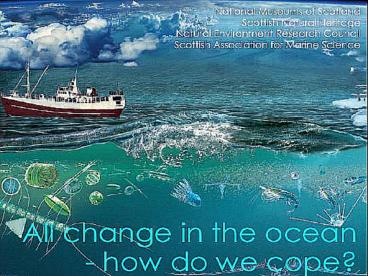Artist:Glynn Gorick - PowerPoint PPT Presentation
1 / 32
Title:
Artist:Glynn Gorick
Description:
Changes in range of copepod species. from Beaugrand et al. 2002 Science in press. ... calanoid copepod biomass. mean abundance of Pseudocalanus spp. North Sea ... – PowerPoint PPT presentation
Number of Views:98
Avg rating:3.0/5.0
Title: Artist:Glynn Gorick
1
(No Transcript)
2
ArtistGlynn Gorick
3
The Prologue - Marine Food Chain
4
(No Transcript)
5
(No Transcript)
6
5 mm
Starring
Calanus finmarchicus
which is a copepod
7
5th level
1st level
4th level
3rd level
2nd level
8
Evidence of past changes in fish stocks
9
- It comes up to the shore here from the great fish
pond which is the Icelandic Sea, towards the
winter when the great part of other fish have
left the land. And the herring does not seek the
shore along the whole, but at special points
which God in his Good Grace has found fitting,
and here in my days there have been two large and
wonderful herring fisheries at different places
in Norway. The first was between Stavanger and
Bergen and much further north, and this fishery
did begin to diminish and fall away in the year
1560. And I do not believe there is any man to
know how far the herring travelled. For the
Norwegian Books of Law show that the herring
fishery in most of the northern part of Norway
has continued for many hundreds of years,
although it may well be that in punishment for
the unthankfulness of men it has moved from place
to place, or has been taken away for a long
period. - Clergyman Peder Claussøn Friis (1545-1614)
10
Herring migration - traditional
from Vilhjalmsson 1997
11
Norwegian spring spawning herring
12
Herring migration 1965 - 66
from Vilhjalmsson 1997
13
Herring migration 1995
from Vilhjalmsson 1997
14
Evidence of long term change
15
What is different now?
1 the intensity of fishing has increased
16
(No Transcript)
17
Effect of fishing on life expectancies
gadoids
18
Effects of fishing
- Stocks are depleted and more vulnerable to
additional stresses. - Fishing affects other components of marine
ecosystems directly or indirectly.
19
What is different now?
2 the last 15 years have been warmer (and there
is increasing evidence of effects of climate
change)
20
Northern Hemisphere observed and predicted
temperature
21
(No Transcript)
22
Sea surface temperature from satellites
23
Effects of climate
- Changes in distribution and growing seasons.
- A steady trend (e.g. in temperature) eventually
has a big effect.
24
What is different now?
3 we have better information and understanding of
changes and causes
25
Alister Hardy with an early plankton recorder
26
Sub Arctic species incl. C. finmarchicus
Changes in range of copepod speciesfrom
Beaugrand et al. 2002 Science in press. Based on
176,778 CPR samples.Red means more - blue means
less
Southern shelf edge species
27
Calanus abundance map compiled from data supplied
by SAHFOS to NERC Marine Productivity project
GR2/2749 and data from the EU-TASC project
1950-1999 mean abundance
28
NORTH ATLANTIC OCEAN
SHELF SEAS
Climate forcing of ocean circulation
29
North Sea plankton
- For nerds
- Monthly values of the first PC (33.78 of the
total variability). - Main variables by order of importance
- mean abundance of C. finmarchicus
- mean abundance of euphausiids
- mean size of calanoid copepod
- mean abundance of C. helgolandicus
- calanoid copepod biomass
- mean abundance of Pseudocalanus spp.
Months
Years (1958-1999)
This does not mean that changes in plankton are
the only cause of decline in cod
30
How can we apply our improved understanding?
- By distinguishing between changes caused by
fishing and those caused by other factors
(although this cannot be split as either/or). - By exploring the likely consequences of climate
scenarios. - By specific applications (e.g. growth and
recruitment forecasts)
31
Some big questions remain
- Why has Calanus declined over 40 years?
- What are the consequences for food chains?
- Has total productivity been affected?
32
(No Transcript)































